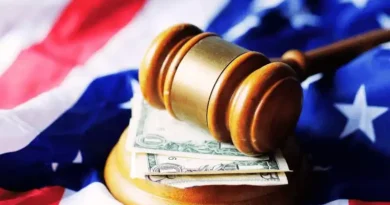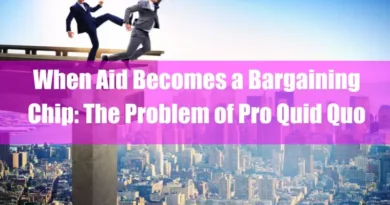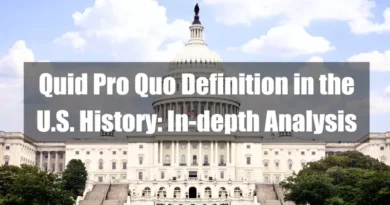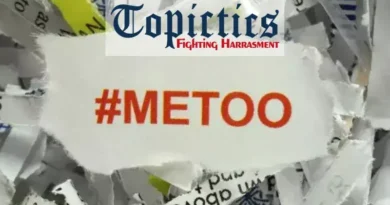Can a Campaign Promise Be Considered a Quid Pro Quo?
Yes, a campaign promise can be considered a quid pro quo if there is a clear and explicit agreement where a candidate promises to do something specific, like changing a policy or giving a benefit, in return for something of value, like votes, donations, or support. This means both sides clearly understand that the candidate’s promise depends on getting that benefit, making it a kind of deal.
Campaign promises are common in elections, but whether they are legal or ethical depends on the situation. Some quid pro quo deals can break campaign finance laws or ethical rules, especially if they involve direct financial benefits or unfair influence.
Takeaways
| Key Points |
|---|
| Quid pro quo in politics refers to an exchange where a politician grants a favor, such as a policy decision or government action, in return for something valuable like campaign contributions or political support, making the transaction inherently reciprocal. |
| While campaign promises are common, they may be considered quid pro quo when a direct agreement exists between a candidate and a donor, where policy commitments or government actions are explicitly tied to financial contributions or other forms of support, potentially violating campaign finance laws and anti-corruption statutes. |
| Legal implications of quid pro quo include fines, penalties, and criminal charges, with regulatory bodies like the Federal Election Commission (FEC) enforcing laws to prevent undue influence, though challenges remain in closing loopholes and ensuring compliance. |
| Ethical concerns emphasize the need for transparency and accountability to prevent politicians from prioritizing private interests over the public good, as seen in high-profile cases like those of Rod Blagojevich and Bob McDonnell, which highlighted the complexities of legal definitions and enforcement. |
| Ultimately, maintaining trust in the political system requires strict enforcement of campaign finance laws, public awareness, ethical training for politicians, and complete transparency in campaign financing to safeguard democracy from the risks of corruption and undue influence. |
What Constitutes a Quid Pro Quo in Politics?
Quid pro quo in politics refers to an arrangement where a favor is granted in exchange for something of value. The Latin phrase translates to “something for something,” emphasizing the reciprocal nature of the exchange. In political contexts, this often involves a candidate or official offering a specific policy, action, or benefit in return for support through votes, campaign contributions, or other forms of assistance.
The key element is the transactional nature of the agreement, where both parties understand that the favor is contingent upon receiving the agreed-upon benefit.
How Can Campaign Promises Be Viewed as Quid Pro Quo?

Campaign promises can be viewed as quid pro quo when there is an explicit agreement that a candidate’s commitment to a policy or action is directly tied to receiving support, such as financial contributions or votes. For example, if a politician explicitly promises to enact legislation beneficial to a particular group in exchange for donations, this could be considered a transactional relationship and possibly illegal.
However, not every campaign promise that attracts support is inherently a quid pro quo. Only when a commitment is explicitly made in return for something tangible—like donations or other forms of support—does it cross into quid pro quo territory. These arrangements raise concerns about undue influence by special interests, as they can undermine the integrity of the political process by prioritizing the interests of donors over the public good.
What Are the Legal Implications of Quid Pro Quo Campaign Promises?
Legally, quid pro quo arrangements in campaign promises can lead to significant consequences. Campaign finance laws and anti-corruption statutes are designed to prevent undue influence and corruption in the political process. If a campaign promise is deemed a quid pro quo, it may violate these laws, leading to legal action against the involved parties.
The Federal Election Commission (FEC) and other regulatory bodies scrutinize such arrangements to maintain the integrity of elections. Violations can result in penalties, fines, and, in severe cases, criminal charges. The legal framework, including campaign finance laws and anti-corruption statutes, is designed to promote political decisions in the public interest. However, the effectiveness of these laws in preventing backroom deals or undue influence depends significantly on consistent enforcement, thorough compliance, and the ability to close loopholes that may allow subtle forms of corruption.

How Do Ethical Standards Address Quid Pro Quo in Campaign Promises?
Ethical standards in politics emphasize transparency, accountability, and acting in the public’s best interest. Quid pro quo arrangements in campaign promises conflict with these principles by prioritizing private gain over the public good. Politicians and candidates ‘ ethical guidelines and codes of conduct aim to prevent such practices by promoting honesty and integrity in campaigning.
Public officials are expected to avoid agreements seen as trading favors for support. Upholding these ethical standards is crucial for maintaining public trust and ensuring the political process remains fair and impartial.
What Examples Highlight Campaign Promises as Quid Pro Quo?
One prominent case involved Illinois Governor Rod Blagojevich, arrested in 2008 for attempting to sell or trade the U.S. Senate seat vacated by President-elect Obama. Blagojevich was accused of seeking campaign contributions, a high-paying job, or other personal benefits in exchange for appointing a preferred candidate to the Senate seat. This clear exchange of political favor for personal gain exemplifies quid pro quo.
Another notable example of potential quid pro quo in politics is the case of former Virginia Governor Bob McDonnell and his wife, who were convicted in 2014 on corruption charges. They were found guilty of accepting gifts and loans worth approximately $175,000 from Jonnie Williams, a businessman seeking to promote his company’s tobacco-based dietary supplement, in exchange for favors such as setting up meetings and hosting events. However, in 2016, the U.S. Supreme Court unanimously overturned the convictions, ruling that McDonnell’s actions did not constitute an “official act” under federal bribery law.
While the case highlighted the complexities and legal nuances surrounding quid pro quo in politics, it also narrowed the legal definition of what can be considered corruption, raising questions about the ethical boundaries of such relationships.
Additionally, Hillary Clinton’s 2016 presidential campaign faced scrutiny over allegations that donors to the Clinton Foundation received preferential treatment while she was Secretary of State. Though no direct quid pro quo was proven, the perception of potential favoritism in exchange for donations raised significant ethical concerns. It highlighted the complexities of campaign finance and political influence.
What Role Do Campaign Finance Laws Play in Preventing Quid Pro Quo?
Campaign finance laws are crucial in mitigating quid pro quo arrangements by regulating political money flow. These laws impose limits on contributions, mandate the disclosure of donors, and set stringent rules for campaign expenditures. The Federal Election Commission (FEC) oversees these regulations, ensuring that campaign financial transactions are transparent and lawful.
By monitoring contributions and expenditures, these laws aim to prevent undue influence and maintain the integrity of the electoral process. Violations can lead to penalties, fines, and legal actions, deterring candidates and donors from engaging in questionable exchanges.

How Does Public Perception Influence the Understanding of Quid Pro Quo in Campaign Promises?
Public perception significantly shapes the understanding of quid pro quo in campaign promises. Voters are increasingly vigilant about potential corruption and favoritism in politics. When candidates make promises that appear contingent on specific support, it raises suspicion and undermines trust. Transparency and clear communication are essential to maintaining public confidence.
Suppose the electorate perceives that politicians prioritize private interests over the common good. In that case, it can lead to disillusionment and reduced civic engagement. Thus, how the public views campaign promises directly impacts the credibility of political figures and the democratic process.
What Measures Can Prevent Quid Pro Quo in Political Campaigns?
Preventing quid pro quo in political campaigns requires a multifaceted approach.
- Firstly, stringent enforcement of campaign finance laws is essential. Regulatory bodies like the FEC must actively monitor and address violations.
- Secondly, transparency in political contributions and expenditures is vital. Candidates should disclose their donors and the amounts received promptly.
- Thirdly, ethical guidelines and training for candidates and their staff can promote integrity in campaign practices.
- Lastly, public awareness and engagement play a crucial role. An informed electorate can hold candidates accountable, reducing the likelihood of unethical behavior.
Why Is Transparency Crucial in Campaign Promises and Quid Pro Quo?
Transparency is fundamental in addressing concerns about quid pro quo in campaign promises. When candidates are open about their financial backers and the sources of their campaign funds, it fosters trust and accountability. Transparency ensures that potential conflicts of interest are visible and can be scrutinized by the public and regulatory bodies. It also discourages candidates from engaging in covert agreements that could undermine the democratic process.
By promoting openness, transparency helps maintain the integrity of elections and ensures that political decisions are made in the public interest.
Conclusion: Can a Campaign Promise Be Considered a Quid Pro Quo?
- A campaign promise may be considered a quid pro quo if it involves an explicit exchange, where the promise is directly contingent upon receiving something of value, such as money or other favors. This must be clearly defined to meet legal standards.
- These kinds of arrangements carry serious legal, ethical, and practical implications, highlighting the critical need for transparency and accountability in political campaigns.
- While campaign promises are a legitimate way for candidates to communicate their platform, they must serve the public interest and remain free from undue influence or explicit transactions tied to personal or financial gain.
- Upholding these standards is essential to maintaining public trust and protecting the integrity of the democratic process by ensuring decisions are made for the collective good rather than personal benefits.
FAQ
What is “Quid Pro Quo” in a legal context?
Quid pro quo” is a Latin term meaning “something for something.” In legal terms, it refers to an exchange where one party provides something of value in return for something else of equivalent value. This concept is fundamental in contract law, ensuring that agreements involve mutual consideration.
How does “Consideration” relate to quid pro quo in contracts?
Consideration is the value exchanged between parties in a contract, making the agreement binding. It embodies the quid pro quo principle, where each party offers something of value to the other, ensuring a reciprocal exchange. Without valid consideration, a contract may be deemed unenforceable.
What constitutes “Bribery” in the context of political campaign promises?
Bribery involves offering, giving, receiving, or soliciting something valuable to influence a public official’s actions. In political campaigns, if a candidate offers a policy decision or official act in direct exchange for financial contributions or other support, it may be considered bribery, as it entails a corrupt quid pro quo arrangement.
Can “Campaign Contributions” be considered a form of quid pro quo?
Campaign contributions can be scrutinized as quid pro quo if there is evidence of an explicit agreement that the contribution is made in exchange for specific official actions or favors. The legality hinges on whether a clear, mutual understanding links the contribution to a particular governmental act.
What is the “Explicitness Requirement” in proving quid pro quo corruption?
There must be clear evidence of a direct exchange agreement between the parties involved to establish quid pro quo corruption. This means demonstrating that a public official explicitly promised to perform or refrain from a specific act in return for something of value. The explicitness requirement ensures that only clear and intentional exchanges are subject to legal penalties.
How does “Intent” factor into determining a quid pro quo arrangement?
Intent is crucial in identifying a quid pro quo arrangement. It must be shown that the parties involved knowingly and willfully entered into an agreement where one party’s provision of value was contingent upon the other’s specific action or inaction. Without demonstrable intent, establishing a quid pro quo claim becomes challenging.
What role does “Corruption” play in the analysis of campaign promises as quid pro quo?
Corruption involves the abuse of entrusted power for private gain. In the context of campaign promises, if a candidate offers official actions or policies in direct exchange for personal benefits, such as financial contributions, it constitutes corruption. Such quid pro quo arrangements undermine public trust and violate legal and ethical standards.
How is “Solicitation” defined concerning quid pro quo in political campaigns?
Solicitation in this context refers to a public official or candidate actively seeking something of value, such as campaign contributions, with the understanding that they will perform a specific official act in return. This proactive request establishes a quid pro quo arrangement, which is illegal and considered a form of corruption.
What does “Exchange” mean in the framework of quid pro quo?
An exchange in quid pro quo refers to the reciprocal transfer of goods, services, or favors between parties. In legal terms, it implies that each party provides something of value to the other, forming the basis of a binding contract or, in illicit cases, constituting bribery or corruption if the exchange involves public officials and personal benefits.
How does “Mutual Consideration” validate a contract under quid pro quo principles?
Mutual consideration involves each party in a contract offering something of value to the other, ensuring that the agreement is balanced and enforceable. This reciprocal inducement aligns with the quid pro quo principle, as it confirms that both parties are bound by the exchange, providing legal validity to the contract.
What is the significance of the “Official Act” in quid pro quo corruption cases?
An official act refers to any decision or action on a matter involving formal governmental power. In quid pro quo corruption cases, if a public official agrees to perform an official act in exchange for something of value, it constitutes bribery. The specificity of the official act is essential to prove the existence of a corrupt agreement.
How does “Reciprocity” differ from quid pro quo in legal terms?
While both reciprocity and quid pro quo involve exchanges, reciprocity refers to mutual exchanges that are voluntary and not legally binding. In contrast, quid pro quo involves a specific agreement where each party’s obligation is contingent upon the other’s action, often with legal implications, especially if it pertains to public officials and potential corruption.
What is the “Appearance of Impropriety” standard in evaluating quid pro quo allegations?
The appearance of impropriety standard assesses whether an official’s actions might create a perception of unethical behavior, even if no actual misconduct occurred. In quid pro quo allegations, if a campaign promise appears to be made in exchange for contributions or favors, it can undermine public trust, highlighting the importance of transparency and ethical conduct in public office.
How does “Undue Influence” relate to quid pro quo in political contexts?
Undue influence occurs when an individual uses their position or power to sway another’s decisions improperly. In political contexts, if a donor exerts undue influence over a candidate, leading to quid pro quo arrangements where official actions are exchanged for contributions, it compromises the integrity of the political process and may constitute corruption.
What is “Honest Services Fraud” in the context of political corruption?
Honest services fraud refers to a scheme wherein a public official deprives the public of their right to honest services by engaging in bribery or kickbacks. In the context of political corruption, if an official accepts something of value in exchange for influencing their official actions, it constitutes honest services fraud.
How does the “Stream of Benefits” theory apply to quid pro quo cases?
The “Stream of Benefits” theory posits that a series of benefits provided to a public official over time can establish a quid pro quo arrangement, even without a specific exchange for each benefit. This theory recognizes that ongoing gifts or favors may cumulatively influence an official’s actions, constituting bribery.
What is the significance of the “Hobbs Act” in prosecuting quid pro quo arrangements?
The Hobbs Act is a federal law that criminalizes extortion, including actions by public officials who obtain property under the “color of official right.” In quid pro quo cases, if an official uses their position to solicit or receive something of value in exchange for official actions, it can be prosecuted under the Hobbs Act.
How does “Extortion Under Color of Official Right” relate to quid pro quo?
Extortion under the color of official right occurs when a public official uses their position to obtain something of value to which they are not entitled. In quid pro quo scenarios, if an official demands or accepts benefits in exchange for official actions, it constitutes extortion under this doctrine.
What is the “Explicitness Requirement” in the context of campaign contributions and quid pro quo?
In cases involving campaign contributions, the explicitness requirement mandates clear evidence of a direct exchange agreement between the donor and the public official. This means demonstrating that the contribution was made in return for a specific official act, ensuring that legitimate political donations are distinguished from corrupt arrangements.
How does the “McDonnell Test” define an “Official Act” in quid pro quo cases?
The “McDonnell Test,” derived from the Supreme Court case McDonnell v. United States, narrows the definition of an “official act” to decisions or actions on specific and focused matters involving formal governmental power. Merely setting up meetings or hosting events does not qualify; governmental authority must be formalized.
How is “Corrupt Motive” distinguished in quid pro quo cases?
A corrupt motive involves a public official acting with the purpose of receiving personal benefits in exchange for official actions. In quid pro quo cases, demonstrating a corrupt motive requires evidence that the official intended to be influenced by the exchange, differentiating lawful conduct from criminal behavior.
What is the “Color of Official Right” doctrine in relation to extortion and quid pro quo?
The “Color of Official Right” doctrine pertains to situations where public officials exploit their position to obtain something of value. In quid pro quo contexts, if an official uses their authority to solicit or accept benefits in exchange for official actions, it constitutes extortion under this doctrine.
How does “Circumstantial Evidence” support proving a quid pro quo arrangement?
Circumstantial evidence involves indirect evidence that implies the existence of a fact. In quid pro quo cases, patterns of behavior, timing of contributions relative to official actions, and the nature of interactions between parties can serve as circumstantial evidence to establish an implicit corrupt agreement, even without direct proof.









